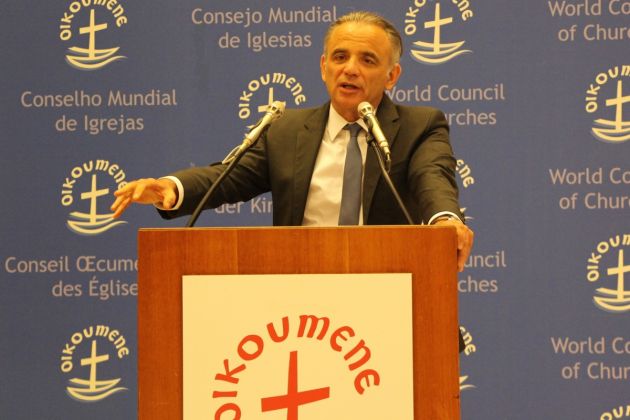UNAIDS and US's PEPFAR launch faith-based HIV initiative

United Nations agencies along with U.S. groups continue to work closely with faith based organizations in global health care especially in the area of HIV and AIDS where they say the role of FBOs is indispensable.
UNAIDS and the United States President's Emergency Plan for AIDS Relief (PEPFAR) have launched a two-year initiative to work with faith-based organizations and strengthen their capacity to respond to HIV.
The initiative was highlighted by the Africa Christian Health Associations Platform a networking forum for Christian Health Associations and Networks from Sub-Saharan Africa after World AIDS Day on Dec. 1.
"Faith-based organizations are essential partners, particularly in the areas of health service delivery and addressing stigma and discrimination," said Luiz Loures, UNAIDS Deputy Executive Director.
"This initiative responds directly to the recommendations from faith leaders at the consultation in April. Faith based responses to HIV are essential to ending this epidemic," he said.
Particularly in hard-hit sub-Saharan African nations churches are heavily involved in caring for those affected by HIV and AIDS.
Unveiled during the current 70th session of the United Nations General Assembly in New York, the first phase of the US$ 4 million program will increase collaboration with faith communities in several UNAIDS and PEPFAR partner countries across five focus areas.
These are: collecting, analyzing and disseminating data; challenging stigma and discrimination; increasing demand for HIV services and retaining people in care; improving HIV-related service provision; and strengthening leadership and advocacy.
Faith-based provision of health services has been a cornerstone of the global HIV response from the earliest days of the epidemic. Religious organizations continue to provide health—and other essential services—to local communities around the world.
In responding to epidemics and health emergencies, there is evidence showing that no matter how effective a biomedical response is, there is always a need for equally effective collaboration with communities.
The new initiative has been developed in response to 10 recommendations made by faith leaders at a consultation in April 2015.
That brought together more than 50 faith leaders from Kenya, Rwanda, Uganda and Tanzania. Recommendations include increased accountability, greater collaboration between faith-based organizations and international partners, and better access to data.
In September 2015, at the United Nations General Assembly, UNAIDS, PEPFAR and Emory University released a report based on the recommendations.
The report, Building on firm foundations, explores in depth the scale and scope of faith-based responses in the four countries.
A landmark series on faith-based health-care published by the Lancet in July 2015 called for more research into the work of faith-based health-care providers.
The series noted that although it is widely known that faith groups provide care and support to often marginalized communities, there is a need to improve the measurement of how they benefit health-care provision.
Sandra Thurman, chief strategy officer for PEPFAR said, "Without the contributions of our faith-based organization partners, the U.S. President's Emergency Plan for AIDS Relief (PEPFAR) could not have achieved the extraordinary impact on the HIV/AIDS epidemic of the past decade.
"Supporting antiretroviral treatment for nearly 4 million people living with HIV, interventions to prevent mother-to-child transmission that allowed approximately 200,000 infants to be born HIV-free in 2011 alone, care for over 4 million orphans and vulnerable children.
She said, "FBOs have been central to all of these achievements."